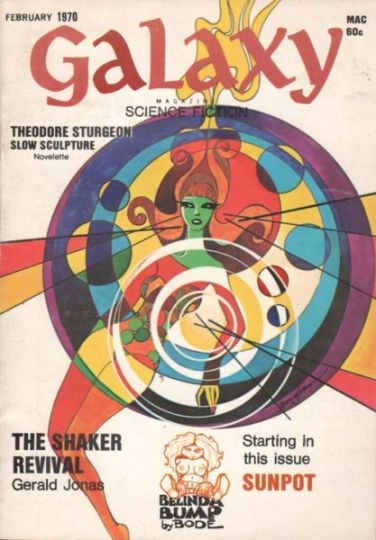Kris
I have read a few pieces of Sturgeon in the past, but I have been nonplussed by it all. Something about his writing just doesn’t seem to connect with me and this continued with “Slow Sculpture”.
This had some standard themes coming through of SF but nothing that felt astounding. The same with the style, literary but not extraordinary. And the “gollywog” reference obviously significantly dates the piece.
I don’t think it is bad as such but there was nothing that really stuck out to me about and I doubt I will remember it much in a couple of weeks.
Brian
I’m fairly experienced with Sturgeon, having been introduced to him via More Than Human and the short story “Microcosmic God” years ago. Since then, I’ve read a good deal more of his material, with “Slow Sculpture” being another re-read for me with these Hugo winners.
“Slow Sculpture” is, much like Sturgeon himself, a victim of bad timing. Had it gone ignored during awards season it would now most likely be remembered as a perfectly fine Sturgeon yarn from the third act of his career. A bit more abstract, what with the location and the lack of character names, than the usual, but it’s rather on-the-nose and middle-of-the-road by Sturgeon standards. It’s not as deeply humanistic as “The World Well Lost,” nor as fiercely brutish as “Killdozer!” While it does more fall into the camp of Sturgeon the humanist, I don’t think it’s a great exhibition of his virtues, especially for newcomers.
And let’s be clear here, Sturgeon deserved awards recognition. He influenced a great many authors, not least among them Samuel R. Delany, and his works are still largely in print. But unlike, say, Poul Anderson, who was perhaps overly popular with Hugo voters (I’d say only half his wins were deserved), Sturgeon’s win suffers from the fact that it was a consolation prize and everyone must’ve figured it.
Kit
Well. This hits… different… when you’ve been spending some time contemplating your mortality for health reasons recently. And I really can’t disentangle my impressions of it from that element of my life. There’s a lot of language in here I love, especially when he’s describing her reactions to her not-diagnosis and why she didn’t want to go in to get it looked at. I’ve never read any Sturgeon before and was only vaguely aware of the name (is he the same Sturgeon from Sturgeon’s Law?) but I really want to read more now, in a way I haven’t even with the other stories we’ve reviewed that I’ve liked. It’s this strange amalgamation of wish-fulfillment, honesty, and a look at human relationships, with a dash of climate conspiracy at the end that also seems very on-point. He’s not wrong about how it would play out if what can only be considered an alternative medicine were to actually work, and he’s all bitter and jaded and disappointed with the world but it’s not at all unbelievable that when presented with the chance to save the life of a stranger in his orchard that he just goes along with it, because he wants to be doing good; you can see it. (The “but why don’t they want a good thing?” bit at the end is incredibly relatable.) But at the end of the day what really strikes me is the thread of how we look at mortality, and at things we don’t understand. And I’m very glad I encountered this story now, at this moment, in this particular time.

